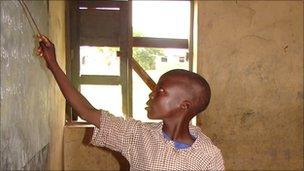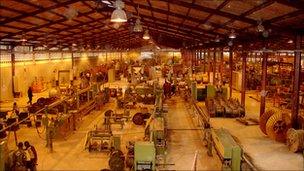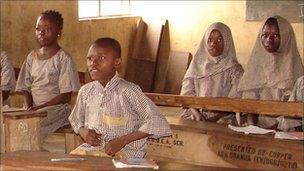Nigeria at 50: 'Nothing to celebrate'
- Published

Many Nigerians are angry at the lack of development but hopeful for change for future generations
Nigeria is about to mark 50 years of independence from Britain with lavish festivities, parades and banquets. But it will be a bittersweet celebration.
In this vast West African state of 150 million people, 1 October has long been designated a day for rejoicing.
Nigeria has survived civil war and more than 30 years of military rule to become a democracy - with massive wealth to spend as the largest oil producer in Africa.
But after 50 years of independence, many Nigerians are questioning whether there is really anything to celebrate.
Adebola Williams, a young television producer and co-ordinator for young people's pressure group, Enough Is Enough, shared her misgivings.
"How can you celebrate Nigeria at 50 when there is no constant supply of light? How can you celebrate a nation where businesses are dying, and where people are suffering? There is nothing to celebrate."
This viewpoint is shared by one of the country's most distinguished novelists, Chinua Achebe, who believes Nigeria has squandered its resources.
"We really ought to be talking about a different kind of nation. The resources are so huge, and we are wasting it."
It is the same story right across this energetic, vibrant state.
People talk of wasted opportunities, of oil revenues squandered by a rich elite, and the corruption that has held Nigeria back. And then there are complaints about bad roads and the lack of reliable electricity supplies.
Hi-tech cables
At an industrial estate just outside Lagos, I met George Onafowokan, the young managing director of an all-Nigerian family firm, Coleman Wires and Cables.
The firm has invested $30 million (£19.1m) in a state-of-the-art factory that produces the high-tech cables that Nigerian industry desperately needs.
The impressive site is the size of several football pitches and the factory floor is covered with enormous copper and aluminium coils and machines that stretch wires to exactly the right dimensions.

The cable-making factory often grinds to a halt due to a lack of power
Chinese technicians were looking on to make sure that everything was running smoothly. And yet, when I visited, this vast plant came to a halt every few minutes because of yet another power cut.
Mr Onafowokan said he had waited for months to be connected to the national grid, and power is still not guaranteed.
Last year, he spent $400,000 (£254,407) on diesel for generators to keep the factory running and this year, he says, he will be spending twice as much.
"You just can't think about it or else you would just be driving yourself silly."
Reuben Abati, chairman of the editorial board of Nigeria's Guardian newspaper group, is even more forthright.
"The biggest problem that Nigeria has had in 50 years of independence is corruption. Close to about $40 billion (£25.4bn) has been stolen.
"Can you imagine what could have been achieved with that money, in a country where the school system has collapsed, the roads are pot-holed and there is no regular electricity?
"The biggest threat to entrepreneurship in Nigeria would seem to be power supply. So much money has been devoted to maintenance over the years - so what has happened to all that money?"
Failing teachers
There are complaints too about the collapse of commercial farming in a country that once used to export food but now spends $6 billion (£3.8bn) each year on food imports.

State school improvement teams are trying to improve teaching standards in Nigeria's Kwara state
And in a country where teachers were among the many middle-class professionals who fled during the years of military rule, there are serious concerns about the education system.
In Kwara State, in the west of the country, Governor and presidential hopeful Bukola Saraki asked all current teachers to take a test that was designed for Primary 4 pupils, aged between eight and nine.
An example question: David left his sister's place at 0730. It was a 40 minute walk, so what time did he arrive?
Only seven out of 20,000 teachers passed the test. Governor Saraki was shocked by the results.
"You would be surprised. A lot of the teachers struggled to answer that kind of question."
Because of this, state school improvement teams are now at work in the classrooms, desperately trying to improve standards.
When I visited Lagos back in the 1990s, in the era of the military dictator General Sani Abacha, I went to meet the late Fela Kuti, Nigeria's legendary musician and political activist, at his club The Shrine.
It has now been replaced by the far larger New Shrine, where Fela's son Seun continues his father's musical and political tradition.
"I do not think my father would be writing about the 50th anniversary. But I am sure he would share my view. He would not be very optimistic."
Many Nigerians we met share his anger at the lack of development in their country over the past 50 years, but are determined that there has to be change.
The last presidential elections, three years ago, were marked by ballot-rigging and intimidation, but Nigeria's new leader Goodluck Jonathan, insists that corruption must be stopped.
Next year's presidential elections will be crucial in showing whether all the talk of good governance has really made a difference and whether Nigeria is at last becoming a successful superpower, 50 years on.
Africa at 50 – Nigeria, presented by Robin Denselow, will be broadcast on BBC Radio 4 on Sunday 26 September at 1330 BST, or listen afterwards via BBC iPlayer.
Do you live in Nigeria? Or are you part of the large Nigerian diaspora around the world? We would like to hear from you. How will you be commemorating independence? What does it mean to you? How has your country changed?
- Published23 September 2010
- Published22 September 2010